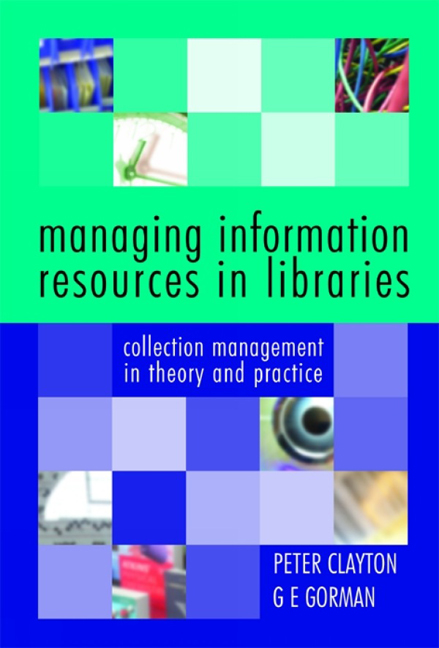Book contents
- Frontmatter
- Contents
- About the authors
- Preface
- 1 Managing information resources in context
- 2 Collection management and collection development policies
- 3 Conspectus
- 4 Resource sharing and co-operative collection development
- 5 Selection: policies and procedures
- 6 Selection resources
- 7 Acquisitions processes and procedures
- 8 Budget management
- 9 Collection evaluation and review
- 10 Preservation and weeding
- The literature of collection management Adela Clayton
- Index
8 - Budget management
Published online by Cambridge University Press: 08 June 2018
- Frontmatter
- Contents
- About the authors
- Preface
- 1 Managing information resources in context
- 2 Collection management and collection development policies
- 3 Conspectus
- 4 Resource sharing and co-operative collection development
- 5 Selection: policies and procedures
- 6 Selection resources
- 7 Acquisitions processes and procedures
- 8 Budget management
- 9 Collection evaluation and review
- 10 Preservation and weeding
- The literature of collection management Adela Clayton
- Index
Summary
Focus questions
• How are most library budgets formulated?
• What are some of the advantages of outsourcing in materials supply?
• What are some of the problems associated with the prepayment of serials subscriptions, and what may be done to address these?
• What is the difference between commitment and expenditure, and why is this distinction important?
• Why do most larger libraries use some type of formula in the internal allocation of their materials budgets?
• What are some of the hidden cost implications of licensing of electronic media?
• What is the underlying purpose behind the audit of library systems and procedures?
The classic definition of a budget is that it is a plan expressed in financial terms. This book is not the place for an extensive discussion of the various approaches to budgeting, nor indeed to planning generally. Instead, in this chapter we will cover only those aspects of budgeting of particular relevance to collection management.
This chapter focuses on budget management, not on obtaining a budget in the first place. We are only too well aware that, for many libraries in developing countries, and for some in the developed world, fundraising is of much more immediate importance. Fundraising (‘library development’ in the USA) is a topic that deserves greater treatment than we can provide in the present volume. Readers are instead referred to the by now considerable literature on it. Another issue of concern to many libraries is budget cuts (or at least, failure to increase materials and other funding in line with increases in costs and usage). Again, there is a very large literature on this – in fact, at times it seems that every current professional journal issue makes some reference to the need for more realistic funding provision. This, too, is really outside the scope of the chapter.
It is worth noting that in many organizations, the whole budget process can be an intensely political area. Unless this is an sphere in which you are both skilled and comfortable, it is usually best to leave the question of an overall budget allocation for the library to others who are – perhaps the chief librarian, or powerful supporters elsewhere within your organization. On the other hand, those who find they do have these skills should also find both they and their library have an assured future.
- Type
- Chapter
- Information
- Managing Information Resources in LibrariesCollection Management in Theory and Practice, pp. 140 - 159Publisher: FacetPrint publication year: 2006



